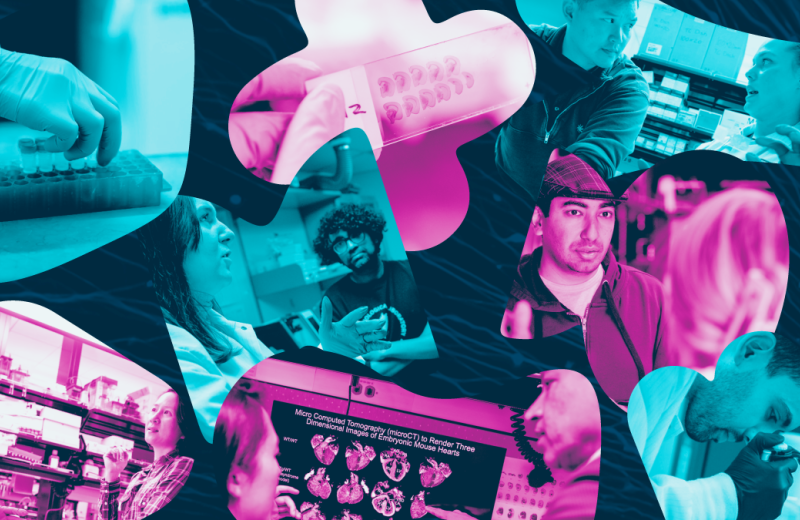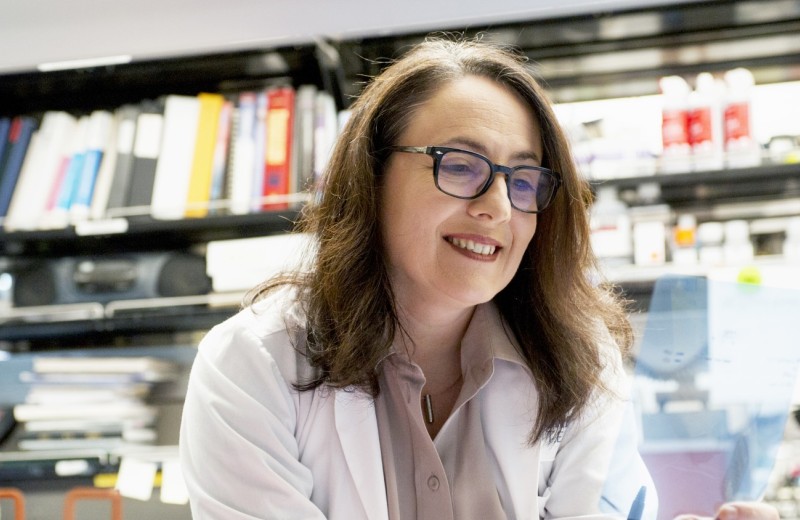Gladstone NOW: The Campaign Join Us on the Journey✕

SAN FRANCISCO, CA—April 29, 2011—The Hellman Family Foundation has donated $1 million to the Gladstone Institutes to help spur the development of medications for Alzheimer's disease.
Gladstone, a leading and independent biomedical-research organization, will use the gift to create The Hellman Family Foundation Alzheimer's Research Program at Gladstone. The program will focus on speeding the transfer of laboratory research to the pharmaceutical industry so that effective drug treatments can be created to prevent, treat or cure this devastating brain disease.
“This is promising news for those who suffer at the hands of Alzheimer's,” said Steven Finkbeiner, MD, PhD, a neurodegenerative disease expert and the Gladstone senior investigator who will head the research program. “This generous gift will help us encourage industry interest in developing Alzheimer's drugs, as we work to make the clinical trials for those drugs more effective and less expensive.”
The need is great. Alzheimer's disease—the most common form of dementia—afflicts an estimated 5.4 million people in the United States alone, at an annual cost $183 billion. Without a therapeutic breakthrough, the number of Americans with Alzheimer's disease is expected to double by 2050, as a new case develops every 33 seconds. Against this stark backdrop is an even starker reality: not a single disease-modifying therapy exists for this or other devastating neurodegenerative diseases. In addition, the late-stage pipeline of new therapeutics for neurodegenerative diseases is nearly empty.
“We're delighted to tap Gladstone's Alzheimer's expertise to help reduce the suffering of millions of Alzheimer's patients and their families,” said Warren Hellman of the Hellman Family Foundation. “Because worthy discoveries in the lab often have difficulty getting funding until they have demonstrated commercial viability, we believe our contribution to Gladstone can help bridge that gap. We want to make sure potentially effective therapies for Alzheimer's developed at Gladstone aren't lost in this ‘Valley of Death’ caused by lack of funding sources.”
The Hellman Family Foundation Alzheimer's Research Program at Gladstone will operate in collaboration with the Memory and Aging Center at the University of California, San Francisco (UCSF), and will leverage infrastructure, resources and research from Gladstone's existing Taube-Koret Center for Huntington's Disease Research. This sharing will mean a more productive use of budgets as well as faster drug discovery across neurodegenerative-disease areas. Already, the two most promising drug candidates that the Taube-Koret Center has developed for Huntington's disease may also prove effective for dementia.
“We will emphasize common threads that cross multiple neurodegenerative diseases, such as Huntington's and Parkinson's diseases,” said Gladstone President R. Sanders Williams, MD. “By testing potential drugs in several models of different diseases, we can reduce the risk inherent in relying on one particular testing model, thereby increasing industry's desire to take a potential drug into clinical trials.”
Together, Gladstone and UCSF will develop biomarkers for Alzheimer's and other neurodegenerative diseases, as well as behavioral tests that can better bridge the lab work done with mice and the tests performed on people in the clinic. Gladstone scientists, including Dr. Finkbeiner, Paul Muchowski, PhD and Yadong Huang, MD, PhD will join forces with Bruce Miller, MD, and colleagues at UCSF's Memory and Aging Center to establish clinical tests that track the progression of Alzheimer's disease faithfully in people and in laboratory models.
All of this work will be built on Gladstone's extensive success with Alzheimer's research. Lennart Mucke, MD, who oversees neurodegenerative research at Gladstone, won the prestigious Potamkin Prize last year for developing experimental strategies to make the brain more resistant to Alzheimer's.
The Hellman Family Foundation Alzheimer's Research Program at Gladstone will also build on a recent breakthrough in stem cell technology known as iPS, discovered by Gladstone Senior Investigator Shinya Yamanaka, MD, PhD. Using iPS, the program will use skin cells of Alzheimer's patients to create cells similar to embryonic stem cells for laboratory discovery and testing of potential drug therapies. This is likely to be a key component of the program's future success. Some funds will also go to a third-generation robotic microscope and a small-molecule library for drug screening.
About the Gladstone Institutes
Gladstone is an independent, nonprofit biomedical research organization dedicated to accelerating the pace of scientific discovery and biomedical innovation to prevent illness and cure patients suffering from cardiovascular disease, neurodegenerative disease, or viral infections. Gladstone is affiliated with the University of California, San Francisco.
Want to Join the Team?
Our people are our most important asset. We offer a wide array of career opportunities both in our administrative offices and in our labs.
Explore CareersGladstone’s Scientific Highlights of 2025
Gladstone’s Scientific Highlights of 2025
From fundamental insights to translational advances, here’s how Gladstone researchers moved science forward in 2025.
Gladstone Experts Alzheimer’s Disease Autoimmune Diseases COVID-19 Neurological Disease Genomic Immunology Cardiovascular Disease Data Science and Biotechnology Infectious Disease Conklin LabScience in Seconds | The Thinking Microscope: Research Powered by an AI Brain
Science in Seconds | The Thinking Microscope: Research Powered by an AI Brain
In this video, Steve Finkbeiner and Jeremy Linsley showcase Gladstone’s groundbreaking “thinking microscope”—an AI-powered system that can design, conduct, and analyze experiments autonomously to uncover new insights into diseases like Alzheimer’s, Parkinson’s, and ALS.
Gladstone Experts ALS Alzheimer’s Disease Parkinson’s Disease Neurological Disease Finkbeiner Lab AI Big DataKaterina Akassoglou Receives Zenith Fellows Award to Advance Alzheimer’s Research
Katerina Akassoglou Receives Zenith Fellows Award to Advance Alzheimer’s Research
Akassoglou has opened doors to understanding how the blood protein fibrin is involved in Alzheimer’s and other neurodegenerative diseases.
Awards News Release Alzheimer’s Disease Center for Neurovascular Brain Immunology Akassoglou Lab



